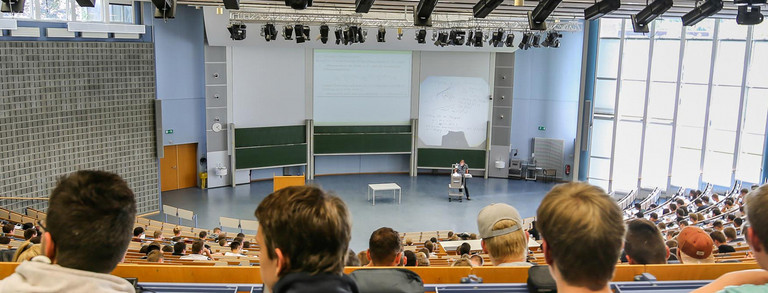Chemistry
Summary
| Degree | Bachelor of Science (B.Sc.) |
|---|---|
| Subject group | Natural Sciences and Computer Sciences |
| Standard program duration | 6 semesters |
| Admission requirements |
none
|
| Start of studies |
Winter semester
|
| Language | German |
| Further information | Website of Department of Chemistry and Chemical Biology |
| Department | Chemistry and Chemical Biology |
Overview
Chemical products are found everywhere in our everyday lives, for example in medicines, storage media, plastics, technical products and analytical equipment. Chemists are involved in the basic research, development and improvement of these and many other products. They analyse the structure and properties of substances, experiment with compounds and research innovative applications.
The Bachelor's degree program in Chemistry consists of the following modules:
- Chemistry (general, inorganic, organic and physical)
- Mathematics and statistical methods
- Physics
- Toxicology and Law
- Applied Analytics and Structure Elucidation
- Biochemistry and Molecular Biology
- Compulsory Elective Lectures and Practicals
Most of the compulsory courses are accompanied by laboratory courses. Together with the associated seminars, these comprise for almost 50% of the attendance time in the program. In addition, there is the Bachelor's thesis, which contains a large practical component and introduces students to scientific work.
Skills and knowledge
No previous knowledge or practical experience of chemistry is required, as all the basics are taught during the program. However, the more chemistry knowledge students have, the easier it will be to get started. A basic knowledge of mathematics is required. Towards the end of the bachelor's degree program, it is necessary to read and understand scientific publications in English, and it may happen that advanced laboratory courses are supervised by English-speaking PhD students and protocols have to be written in English. A basic knowledge of English is therefore an advantage. However, English language skills can be acquired and improved during the course of the program by attending free language courses at the TU Dortmund.
For the degree program in general, students should enjoy chemistry and experimentation. Students should also have the ability to work in a team, be persistent, motivated, enjoy learning and be able to work independently.
To prepare students for their studies, the Department of Chemistry and Chemical Biology offers a preparatory course during the last two weeks before the start of the program in the winter semester. In this course, chemical and mathematical material is repeated.
Field of activity
Chemists have a wide range of career prospects, for example in the following areas:
- Innovative materials (e.g. plastics with special properties)
- Disease control agents
- Additives (e.g. flame retardants, plasticisers, light stabilisers)
- Computer and microelectronic products
- Media for storing energy, information, etc.
- Development of sustainable products
- Development of new tests, measurement methods and equipment...
Chemists can work not only in research and development, but also in application technology, process optimization, quality management, chemical analysis, product management, sales, marketing, patents, documentation, organization, corporate communications, public relations, business consultancy, insurance, pharmaceutical consultancy, etc.
The Bachelor's degree qualifies students for professional life. However, almost all students go on to pursue a Master's degree and often a doctorate.
The Bachelor’s degree qualifies graduates for professional life. Most, however, pursue a Master’s degree and often a doctoral degree.
Additional information
A special feature of the Bachelor's degree course in Chemistry at TU Dortmund University is the intensive support offered to students in the introductory phase of their studies through a preparatory course, various information events, a mentoring program and events organized by the student council during the orientation phase. In addition, tutorials are offered in the first semesters of study alongside exercise groups, in which individual questions about the respective courses can be clarified.
A semester or year abroad is particularly possible in the Master's phase, as there are no longer any compulsory courses to complete, only compulsory elective courses with certain framework requirements. Different courses, a research laboratory course or the Master's thesis can be completed abroad.





![[Translate to English:] Partner Four hands are holding the green logo of TU Dortmund University](/storages/tu_website/_processed_/1/d/csm_Partner_Nicole_Rechmann_KW_670eba0154.jpg)




![[Translate to English:] Forschung An apparatus with tubes in a laboratory](/storages/tu_website/_processed_/0/c/csm_Forschung_Juergen_Huhn_4fa3153b51.jpg)
![[Translate to English:] Studium Five students are sitting in a lecture hall. They are talking to each other.](/storages/tu_website/_processed_/c/9/csm_Studium_FelixSchmale_dbdbfb0dd7.jpg)





